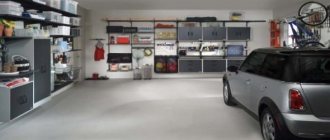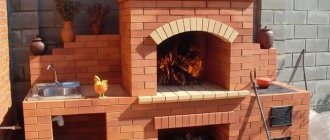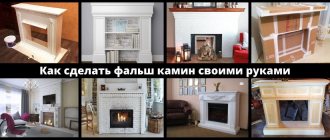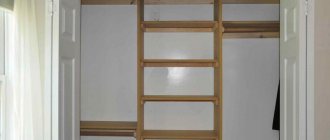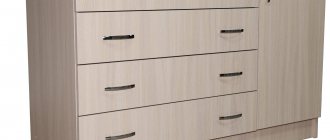Arranging a garage is a very important detail in the life of every car enthusiast, and in order to properly organize the space, you can make shelves in the garage with your own hands. In addition to storing a car, even the most spacious garage often accumulates a large number of additional car accessories that clutter the space. Shelves and racks are a great help in this matter - they will free up the floor and prevent necessary things from getting lost.
DIY garage shelves
Shelves of various configurations can accommodate many different-sized items and help maintain order in the room. Making shelves yourself will help not only save money, but also arrange everything the way you want. You will learn how to create garage shelves with your own hands from our article.
General design issues
Rack with shelves
First of all, you should forget about the first ideas that come to mind - creating the simplest hanging shelves, with a load or area that can accommodate all the property currently contained in the garage. Firstly, this is not rational from the point of view of their manufacture, and secondly, over time, the volume of things stored in the garage increases, so new and new designs will have to be made.
Therefore, it is immediately necessary to plan the design of the shelves in such a way that it is:
- universal
- expandable
- as easily movable as possible
That is, it is advisable not to make each shelf separately, but to make an entire rack consisting of several shelves as a single structure.
Rack with cabinet
The next important question is what the design of the rack will be - collapsible or not. Typically, non-removable structures are more durable and can withstand heavy loads, however, their disadvantages include difficulties in expansion, dismantling and transportation.
Collapsible structures are less stable , their rigidity is far from that of non-collapsible ones. Often, for additional stability, such structures have to be attached to walls. However, they have two special advantages - easy expandability and mobility. In addition, thanks to their modularity, shelving can be made in a variety of sizes.
In this case, the choice depends solely on the desires of each person.
Choosing a rack design
Collapsible rack
Most often, metal or wood is chosen as the material for garage shelving. Combinations of these materials are common. Plastic is rarely used.
The designs of shelving made of wood and metal can be as follows:
- Stationary , that is, designed and assembled for a specific room. Typically, a structure of this kind is assembled once, and to give it additional strength it is attached to the wall or floor (in some cases also to the ceiling)
- Mobile . It is possible to install the structure in different places, or the ability to constantly move it using rollers (wheels)
- Collapsible . The number of shelves, their height, and sometimes their length can be changed within arbitrary limits
- Hanging . Such structures are fastened to the ceiling or walls.
- A combination of different types or with exotic elements (for example, rotating, sliding). Usually, this is more of an aesthetic rather than a practical decision.
A separate group is represented by shelves for storing tools or shelf-containers for storing small parts - usually fasteners, as well as other “loose” items.
Tool storage panel
How such products are constructed is clear from their images. They are used quite often because they are very convenient to use and easy to manufacture. In addition, any available materials can be used as material for them.
Shelves made of many containers
Naturally, the layout of any rack, which includes calculating its dimensions and determining the number of shelves, should be based on the size of the garage, the parking space for the car, and the location of the doors and gates. In some cases, it will be optimal to use corner shelving.
Corner shelves
Additional amenities in the garage
A large garage should be equipped with additional elements, and not just places for tools, spare parts, wheels and waste materials. Some devices will make technical work easier. A workbench is very useful in a garage; it is a table with many additional amenities: bedside tables, shelves, drawers, local lighting, sockets, a vice. Another practical and functional device is a sink. It will provide constant access to water. Thanks to this, you can quickly clean and wash the room, car, parts. To carry out car repairs, it is necessary to make an inspection hole if there was none initially. In a cramped room, it is also worth setting aside space for a cellar for storing pickles and vegetables. If the garage is used all year round, you will need to ventilate and install a heating system. You can organize a small closed cabinet in the shelving structure.
Preliminary preparation
You should start by preparing a drawing. You can do it yourself, using, for example, frames offered for sale as a basis. It is necessary to calculate the overall dimensions of the shelves and the parameters of the base for them.
Moreover, their dimensions should be based on preliminary measurements of the space in the garage. If you take these measurements correctly, you can consider that half the job is already done.
Shelf drawing
- At the same stage, it is necessary to think about how the shelves will be connected to the frame, and the frame itself will be further strengthened by attaching it to the walls or floor.
- An important parameter here will be the height, since, in the case of low ceilings, it is advisable to make the frame height up to the ceiling, leaving no free space.
- Determining the distance between shelves is one of the important design points, since it is this that determines the rationality of distributing things across levels.
- Traditionally, the lower ones are made the most spacious: large and heavy equipment is placed on them; in addition, they are often used to store wheels and rims.
- Usually the following rule is used - the higher the shelf, the less weight should be placed on it and, accordingly, its height is lower. This can be explained quite simply – by increasing the stability of the rack as a whole.
- We should also talk about the depth of the shelving. Shelves that are too narrow make the entire rack impractical, and shelves that are too deep make it much more difficult to access. The optimal depth is 50-60 cm.
- The width is usually determined by the tensile strength of the material from which the shelves are made. There is no need to make the rack too heavy by making shelves more than 1.5 m wide (this will require too thick iron or wood so that they do not sag under the weight). Usually the width is about 90-150 cm.
Let's look at the most popular shelving devices that you can make yourself.
Permissible load
Tires, a motor, wrenches - these are all quite heavy things, and the shelves under them should not sag or break. Therefore, again, think about what you will store and study the characteristics of the rack when purchasing it. Among others, there will be the load that the shelf and the rack section can withstand.
The most “delicate” racks can withstand up to 60 kg per shelf and 350 kg per section. For more or less serious loads, it is better to take these models, which can withstand up to 100 kg per shelf and up to 500 kg per rack. More robust models can support 140 kg per shelf and 750 kg per rack. There are also the most durable models that can withstand a load of 1000-3000 kg per shelf. There is a need for such structures, perhaps, in auto repair shops, when it is necessary to store several sets of wheels, including truck ones.
Simple wooden shelves
Wooden shelving in the garage
Most often, in garages, a simple stationary structure is made independently, located along one or two walls. In the latter case, it can be considered a corner.
This type of shelves has the following advantages:
- low cost compared to metal;
- simple and quick assembly without the need for metal processing (in particular, without welding);
- ease of maintenance;
- naturalness and good aesthetic qualities;
- with proper wood processing and care, a relatively long service life and high structural strength
An approximate view of such structures is given below.
Garage rack
The procedure for making such a structure is as follows:
- The materials from which the racks and the shelves themselves will be made are selected. Hardwoods (larch, oak) are suitable for racks, but, in extreme cases, ordinary pine can be used. The shelves themselves can be made from almost any wood material. Even plywood, chipboard or OSB can be used
- The racks should be made of timber with a cross-section of 10x10 or 5x10 cm. The cross members between the shelves are made from the same timber to give structural strength
- Shelves are cut from the selected material according to measurements
- All structural elements should be treated with an antiseptic before installation to avoid rotting or fungus
- The structure is assembled from racks and crossbars. If necessary, it is additionally reinforced with metal corners and attached to the wall, floor or ceiling
- The racks are marked vertically in the places where the shelves will be attached to them. Their fastening is carried out in various ways: self-tapping screws, tenons, and wood glue are used. In rare cases, dowels are used. Don’t forget about traditional nails, unlike self-tapping screws, they are less likely to come loose. To give extra strength to the shelves, they can also be mounted on metal corners
- After assembly, the ends of the rack are processed, and then the entire structure is varnished or painted
VIDEO: How to make a shelf out of wood
Shelves in the garage: order comes first. General design issues, simple options, step-by-step instructions for making your own (75+ Photos & Videos) + Reviews
Functional purpose
A garage, where all the things are scattered in the corners, immediately makes you want to clean it all out and put things in order. Creative chaos is, of course, good, but important tools must be stored in decent conditions. In addition, it is much more convenient when everything is in its place, and you don’t have to scour the garage for a long time in search of the right thing.
Garage shelves can be made from different materials: wood, chipboard, metal. Combinations of different manufacturing methods are also often found. All materials vary in price and strength, so it is worth considering them in more detail.
Shelving in the garage
Wooden shelves with metal frame
Rack with metal frame
An alternative design option, which is a more expensive, but at the same time more durable and durable solution. The racks in these shelves are made of metal, and the surface of the shelves itself is made of wood or any materials of wood origin.
Such a rack has a higher resistance to moisture and mold. It is more resistant to heat and fire. Moreover, by using metal parts, they can be made dismountable, which will allow you to change the appearance of the structure according to any desire of the garage owner.
Materials and tools needed for work
Corners for shelving in the garage
The racks of such a rack are made from rectangular pipes or from a profile with a width of one of the sides of 5 cm. A 30 mm corner is best suited as crossbars.
The frame is made from a corner, and the thickness of the shelf should be from 1.5 to 3 cm (along the height of the corner). Crossbars made from angles can be attached to the guides in different ways - by welding or using bolts. It all depends on the wishes of the owner.
If you need a durable structure, then welding is preferable; if you require the versatility of the product with the possibility of its further modernization, you should use bolts. The use of bolts allows, for example, to change the height of each level.
Shelves can traditionally be made from any material on hand - from pine to OSB. For reasons of strength, their thickness should not be less than 12-15 mm.
For work you will need the following set of tools:
- drill (screwdriver)
- Bulgarian
- wood hacksaw
- corner
- level
- welding machine (optional)
Manufacturing procedure
Corner shelving frame
Assembling the rack is best done in a free room , and it is advisable to empty the garage of unnecessary things and remove the car from it.
After assembling the frame, it should be screwed to the wall. The assembly sequence is as follows:
- Based on the finished measurements, the material of the racks and corners for the shelves is cut using a grinder
- The racks are marked in those places where shelves will be attached to them
- The corners are bolted to the posts (or welded in the case of a stationary structure). In this case, it is extremely important to maintain a connection angle of 90°, otherwise the structure will turn out skewed
- Similarly, the racks are connected to each other using crossbars, but in this case, right angles must be maintained not only between the racks and crossbars, but between the crossbars and the previously attached corners
- The assembled structure is installed in its place and screwed to the walls and floor. This can be done, for example, using anchor bolts
- The metal frame is sanded using a grinder with an appropriate brush attachment and coated with a primer or paint containing a primer. At this stage, in order to facilitate the labor-intensive process of mechanically cleaning the frame from rust, you can use a chemical rust converter. Typically, converters require a day to dissolve the rust; after which surfaces can be painted without any mechanical or chemical treatment
- After the paint has dried, shelves are cut out of wood or wooden materials and adjusted in size to the finished frame structure
- The shelves are sanded, painted or varnished, and then attached to the frame using bolts or self-tapping screws
VIDEO: DIY universal shelves
Shelves in the garage: order comes first. General design issues, simple options, step-by-step instructions for making your own (75+ Photos & Videos) + Reviews
Useful tips
Shelving is a great way to keep your garage organized.
The specialist gives some tips that will help if you decide to organize the contents of your garage:
- Don't be afraid of costs and wasting time! All this will pay off many times over. Over time, you yourself will understand that organized things will never interfere with your work and will always be at hand.
- You can make or buy a separate rack designed for wheels and tires, a separate one for storing canned jars, a separate stand for gardening supplies, a dial panel on which you can collect keys and screwdrivers. Give free rein to your fantasy and imagination!
- Before you buy or make a rack yourself, draw a drawing, measure the width and height of the place where you want to install the storage system, in short, make sure that the product will fit in the garage and there will be room for a car.
- Remember that wood does not tolerate humidity well, so you should not install wooden racks and shelves where the humidity exceeds 12%.
- Immediately think about what will be on the shelves. Remember that many structures cannot support large items.
- Homemade wooden structures need to be impregnated with an antiseptic to avoid rotting.
- Metal structures are painted or primed to prevent corrosion.
Shelves for storing heavy items
Metal shelving
Typically, metal shelves are used to store very heavy items or items with large dimensions. To securely store things on them, it will be better if they are made as stationary structures.
This approach immediately eliminates bolts as a connecting element. You can buy stationary metal products, the connections of which are provided using various grooves and guides, but this will no longer be an independent production, in addition, such structures are very expensive.
Therefore, it is recommended to use welding to create entirely metal shelves. The use of bolts is allowed in non-critical joints, or where they are assigned the role of fastening light elements.
Metal rack
- As usual, manufacturing begins with the creation of a drawing or sketch . In this case, their location plays an important role. It is advisable to place such products near strong, solid walls. It is possible that a significant part of the load when attaching the rack to the wall will fall on the wall, and if it is of a decorative nature, unpleasant incidents are possible.
- For such shelves, it is best to choose not square profiles as frame elements, but ordinary corners , but with dimensions of at least 50 mm. Often the creation of such products is made not from a frame, but from a wall mount.
- The frame elements are first marked and cut out using a grinder , and then welded into a single structure using a welding machine. At all stages, you should check the right angles of the rack elements: between the racks, crossbars and fasteners.
Frame for metal shelves
- The shelves themselves are made of perforated or rolled steel with a thickness of 1 to 5 mm. Its thickness is determined solely by the desire of the owner.
- At the same time, one should not forget about the weight of the structure . A sheet of rolled steel with dimensions of 50x100 cm and a thickness of 3 mm weighs almost 12 kg, and a sheet with the same dimensions and a thickness of 5 mm weighs almost 20 kg. In addition, do not forget about the cost: a sheet measuring 1000x500x3 mm will cost about 2-3 dollars.
- An alternative would be to use wooden shelves . In this case, you should choose wood with a thickness of 2.5 to 3 cm, which will first need to be treated with a fire retardant to increase its fire resistance.
- These boards can be connected to the frame using bolts. Metal sheets are also attached to the boards with bolts or self-tapping screws. In this case, it is better not to use welding so as not to destroy the wooden elements.
Upon completion of the work, the entire structure must be cleaned of rust and painted.
Making hanging shelves
Hanging wall shelves
There are two types of hanging shelves - wall and ceiling. Wall shelves can be made in open or closed design, sometimes they have a back wall. They are attached to the garage wall using corners or anchors. These shelves can also be either stationary or collapsible.
Ceiling shelves are placed at the highest level and are attached directly to the ceiling. They can be hung on hooks welded to metal ceiling beams. In addition, eye bolts or special long studs are used as fastenings.
Suspended ceiling shelves
The advantages of such shelves include the relative simplicity and speed of assembly. However, they are quite flimsy and cannot support too much weight. On the other hand, no one will place items that are too heavy to be stored at this level for safety reasons.
The manufacture of the frame for such structures, as well as the shelves themselves, repeats the procedures described earlier in the production of wooden shelves with a metal frame. In this case, fastenings are made in the upper part of the frame for connection with hooks or studs installed in the ceiling.
VIDEO: Wooden hanging shelves
Shelves in the garage: order comes first. General design issues, simple options, step-by-step instructions for making your own (75+ Photos & Videos) + Reviews
Secrets of organizing space
The experience of numerous garage owners suggests how to properly place everything on the shelves so that everything fits and nothing falls. Here are some tips you might want to heed:
- It is best to place the rack under the long wall of the garage;
- The most frequently used items are stored on shelves that are easier to access. Everything that is needed from time to time can be placed higher;
- It is better not to place containers near the ceiling that could be knocked over when trying to get them from the top shelf. In general, it is better to store canisters with flammable liquids on the lower shelves away from electrical wiring;
- If you have a large number of tools, you can allocate a separate wooden shelf for it, in which you can make the required number of holes. Screwdrivers are inserted into them, and as a result, the search process is noticeably simplified;
- Perforated panels are perfect for placing keys; hooks are attached to them, which hold the keys well. Such a panel can be made part of the rack or taken outside it;
- for hand-held electric tools, you can provide drawers, or store them in the shelves of the workbench, if one is present;
- To make cleaning easier, some people prefer to use metal mesh shelves. Dust does not linger on them and easily falls to the floor, where it is much easier to remove it;
- tires are stored on the lower shelves, and the shelves themselves are removed, leaving only horizontal crossbars. On a shelf 40 cm deep and 1 m long, up to 5 tires for a passenger car can be placed.
When buying a ready-made rack, find out how long the manufacturer has been on the market, whether users are satisfied with its products, what materials it uses, how it protects against the negative effects of moisture, and what guarantees it offers.
If you have time and opportunity, you can try to build a rack with your own hands; the following videos will help you. Source, portal
Shelves made of metal and plastic
Plastic shelves for tools
Due to its low strength, plastic is rarely used in the manufacture of shelves, however, for storing various small items and light items, this option has a right to exist. Plastic is the cheapest material from which shelves can be made; in addition, with its use you can not only save money, but also decorate your garage design with bright elements.
Such shelves can be made using a wooden or metal frame, in a variety of designs. The design and dimensions depend on the desire and taste of the garage owner.
It must be remembered that such racks have a number of significant disadvantages:
- low fire and heat resistance
- vulnerability to chemically active substances (solvent, gasoline, acetone, etc.)
- low holding weight
Tools required for work
To work, you will need woodworking tools and a screwdriver.
The independent process of making shelves involves preparing available tools.
During the work, the master will need:
- set of wrenches;
- pliers;
- hacksaw for wood;
- welding machine;
- drill;
- combined grinder;
- hammer;
- screwdriver;
- perforator;
- electric jigsaw;
- Bulgarian.
At the preparatory stage and during the installation process, measuring devices are used - a tape measure and a level. Fixation of products is carried out using brackets, anchors or dowels.
